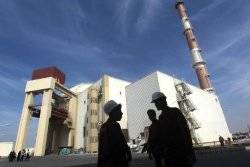Negotiators are due to meet in Vienna to discuss Iran's nuclear programme, a day after the country's supreme leader said he was not optimistic about talks and that they would lead nowhere.
Representatives from the P5+1 Group, so called because it comprises the five permanent members of the United Nations Security Council plus Germany, convene in the Austrian capital on Tuesday to build on progress made in the previous round of talks in November, when Tehran agreed to suspend part of its nuclear enrichment operations in exchange for an easing of sanctions. This latest round of talks is aimed at finding a long-term agreement, and the two sides have until July to find a solution.
High stakes
But on Monday, Iran's Supreme Leader Ayatollah Ali Khamanei said he was pessimistic about talks, although he was not opposed to them.
"I have said before ... I am not optimistic about the negotiations. It will not lead anywhere, but I am not opposed either," Khamenei said during a visit to the Iranian city of Tabriz, according to the official news agency IRNA.
"What our foreign ministry and officials have started will continue and Iran will not violate its (pledge) ... but I say again that this is of no use and will not lead anywhere," Khamenei added.
A senior US official, speaking on condition of anonymity, said on Monday that the negotiation process would be complicated, long and have no guarantee of success.
"When the stakes are this high and the devil is truly in the details, one has to take the time to ensure the confidence of the international community in the result," the official said. "That can't be done in a day, a week or even a month in this situation."
Seven-step plan
Earlier this month, Iran agreed to an inspection of the Saghand uranium mine, as part of a seven-step plan with the International Atomic Energy Agency (IAEA) to ease international fears about its nuclear programme. The two sides reached agreement on seven practical measures to be implemented by Iran by May 15.
But Foad Izadi, from the University of Tehran, told Al Jazeera on Monday that there were two main points of contention regarding the talks and regarding the relationship between Iran and the US.
"There is a problem with rhetoric and there is a problem with enrichment. It's been a difficult issue since the beginning. Iran says article four of the non-proliferation treaty means it can enrich uranium in its own country, America disagrees.
"When politicians and government officials speak they have internal audiences in mind. American officials have said the nuclear issue is not the only problem they have with Iran. All the sanctions that exist are going to remain even if the nuclear issue is dealt with. There are other issues they [Americans] don't like Iran for."
PHOTO CAPTION
A picture taken on October 26, 2010 shows the Bushehr nuclear power plant in southern Iran.
Aljazeera


 Home
Home Discover Islam
Discover Islam Quran Recitations
Quran Recitations Lectures
Lectures
 Fatwa
Fatwa Articles
Articles Fiqh
Fiqh E-Books
E-Books Boys & Girls
Boys & Girls  Articles
Articles










